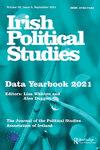After Mobuoy: co-designing environmental governance in Northern Ireland?
IF 0.8
4区 社会学
Q3 POLITICAL SCIENCE
引用次数: 0
Abstract
ABSTRACTAfter the discovery of the Mobuoy illegal dump in Derry, known to the public as one of the largest illegal dumpsites in Europe, the Northern Ireland Environment Agency adopted a so-called ‘co-design’ approach to the remediation of the contaminated site. As part of it, the Mobuoy Stakeholder Group was established so that local communities could represent their concerns and give feedback to the government’s remediation project. Based on semi-structured interviews and policy analysis, this article examined the level of inclusiveness and representativeness of the Mobuoy Stakeholder Group by looking into the decision-making processes over two divisive agendas on the remediation project. This article concluded that a so-called ‘co-design’ approach to remediating the Mobuoy site was significantly misleading. The Mobuoy illegal dumpsite is an alarming case of environmental unsustainability in Northern Ireland, not only because of its massive scale, but also because of the government’s closed and siloed approach to environmental governance. Through a lens of agonistic participation, this article argued that for co-design approaches to environmental governance to function as intended, power inequalities among participants, particularly the government and ordinary citizens, in environmental governance should be taken into consideration seriously.KEYWORDS: Mobuoy illegal dumpagonistic participationNorthern Ireland Environment Agencythe Mobuoy stakeholder groupthe gathering Disclosure statementNo potential conflict of interest was reported by the author.Notes1 After several postponements due to the pandemic and other reasons, the sentencing is like to take place in 2023.2 The secretive, dysfunctional and non-transparent ‘culture of government’, which included civil servants routinely not taking minutes of meetings of Ministers, the power of unelected special advisors, as well an antipathy to public scrutiny and accountability, has been clinically and forensically documented and evidenced in Sam McBride’s investigation and book in to the RHI scandal (McBride, Citation2019).Additional informationFundingThis work was supported by the Northern Ireland Department for the Economy via Queen's University Belfast (International PhD Studentship 00570363).Notes on contributorsJuneseo HwangDr Juneseo Hwang is a part-time lecturer at Sungkonghoe University, South Korea, where he teaches environmental justice and green criminology. Dr Hwang's research interests are environmental peacebuilding, ecological justice, green crimes, and political ecology of development.Mobuoy之后:共同设计北爱尔兰的环境治理?
【摘要】在被公众称为欧洲最大的非法垃圾场之一的德里(Derry)的Mobuoy非法垃圾场被发现后,北爱尔兰环境署(Northern Ireland Environment Agency)采取了一种所谓的“共同设计”(co-design)方法来修复被污染的垃圾场。作为其中的一部分,Mobuoy成立了利益相关者小组,以便当地社区能够表达他们的关切,并向政府的修复项目提供反馈。基于半结构化访谈和政策分析,本文通过研究修复项目中两个分歧议程的决策过程,考察了Mobuoy利益相关者群体的包容性和代表性水平。这篇文章的结论是,所谓的“共同设计”方法来修复Mobuoy站点是明显误导。Mobuoy非法垃圾场是北爱尔兰环境不可持续性的一个令人担忧的案例,不仅因为其规模巨大,还因为政府对环境治理的封闭和孤立。通过竞争参与的视角,本文认为,为了使环境治理的协同设计方法发挥预期的作用,应该认真考虑参与者之间的权力不平等,特别是政府和普通公民,在环境治理中。关键词:Mobuoy非法转储、参与、北爱尔兰环境署、Mobuoy利益相关者团体、收集披露声明、作者未报告潜在利益冲突。注1由于疫情和其他原因,在几次推迟之后,判决可能会在2023年进行。2 .秘密、功能失调和不透明的“政府文化”,其中包括公务员通常不做部长会议纪要,非选举产生的特别顾问的权力,以及对公众监督和问责制的反感。已经在Sam McBride对RHI丑闻的调查和书中得到了临床和法医记录和证据(McBride, Citation2019)。这项工作由北爱尔兰经济部通过贝尔法斯特女王大学(国际博士奖学金00570363)提供支持。作者简介Juneseo Hwang Juneseo Hwang博士是韩国圣公会大学的兼职讲师,教授环境正义和绿色犯罪学。黄禹锡博士的研究方向为环境和平建设、生态正义、绿色犯罪和发展的政治生态学。
本文章由计算机程序翻译,如有差异,请以英文原文为准。
求助全文
约1分钟内获得全文
求助全文

 求助内容:
求助内容: 应助结果提醒方式:
应助结果提醒方式:


